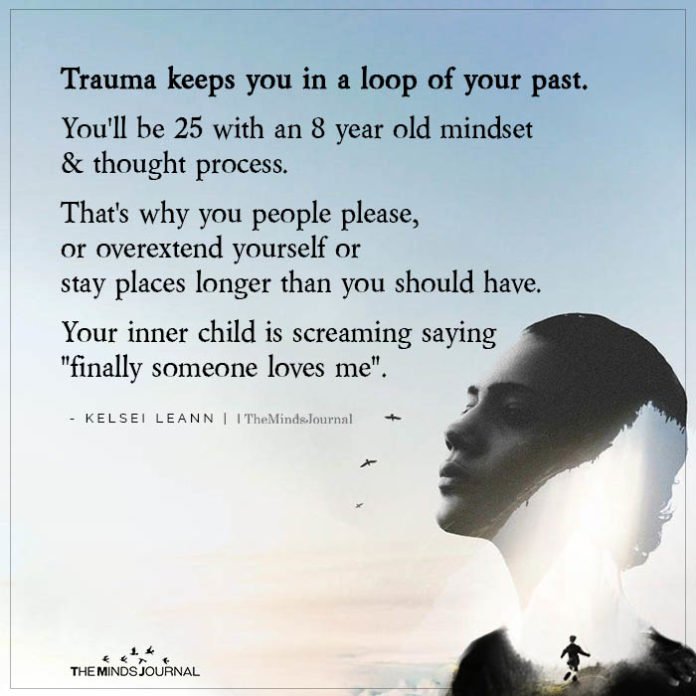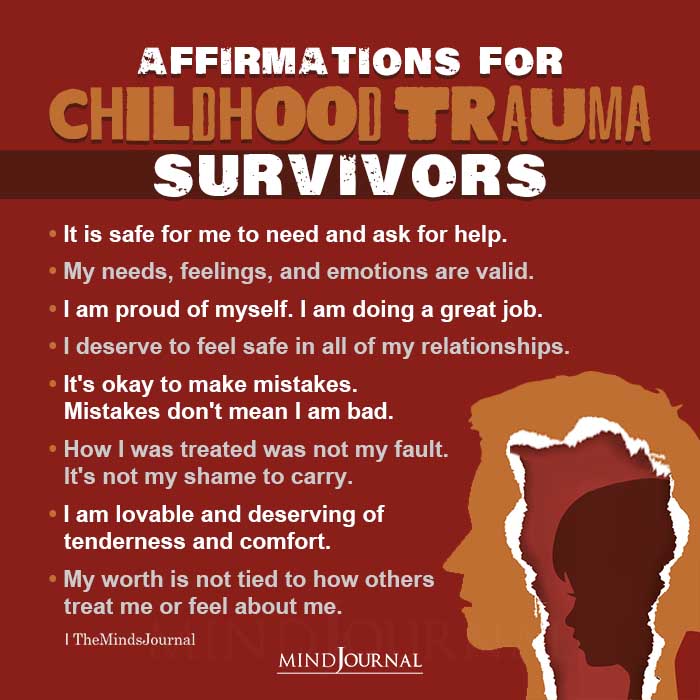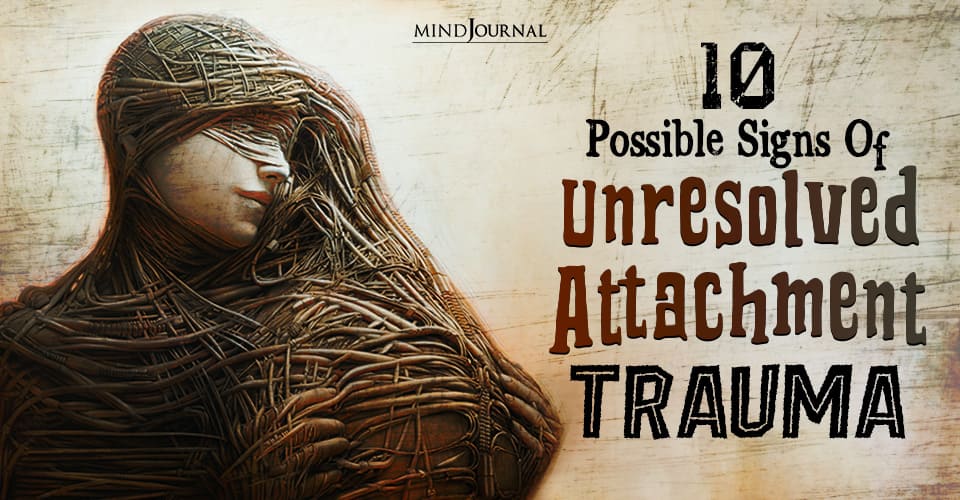Your childhood trauma wounds can haunt you for the rest of your life. Unresolved attachment trauma in adults is more common than you think, however, knowing the signs of attachment trauma in adults can help you understand yourself more and take the necessary steps to heal.
Key Points
- Childhood trauma often refers to traumas experienced in the family of origin during the formative years of our development.
- Although many traumas result from abuse or neglect, not all are.
- Some childhood traumas, such as emotional neglect, were not done purposefully. Some parents might not even have known.
Childhood trauma, while a broad term, usually relates to trauma experienced in the formative years while someone lives with their family of origin.
Not all trauma is the result of abuse or neglect, although these are the things most commonly reported by survivors as being the things that stick with them into adulthood and impact relationships and self-esteem.
Many clinicians call these attachment trauma wounds, as they occur as a result of the actions–or inactions–of the child’s caregivers during the developmental years, which are the years when attachments are formed.
An attachment wound relates to the trauma from having an abusive, absent, or unavailable parental figure.
Some childhood traumas, such as emotional neglect, were not done purposefully–especially if the parents were coming from a place of understanding where this type of “emotionally hands-off” parenting was encouraged.
Related: How Adverse Childhood Experiences Affect Emotional Intelligence
Whether it was intentional or not, this wound creates a sense of shame and low self-worth in a child, who often grows into an adult who blames themself for the actions (or inactions) of their parents.
Attachment wounds relate to unresolved feelings from our caregivers and can manifest through mental health concerns, unhealthy behaviors, and poor coping skills, such as substance use or overeating.
Here are some signs that you might have unresolved trauma wounds. It is important to note that not all of these are necessarily related to trauma experiences, especially if they can be explained by other things such as neurodivergence.
However, if you find that you can relate to many of them, it might be a result of trauma wounds.

10 Possible Signs Of Unresolved Attachment Trauma
1. People-pleasing behaviors.
Children who had to fight hard to get the attention of their caregivers learned that making them happy would therefore make their life easier.
They learned from an early age how to engage in people pleasing to avoid the emotional pain of having someone dislike or be upset with them.
2. Perfectionism.
This is especially common in children who are survivors of emotional neglect. In my practice, I find that this happens for one of two reasons: the first is children who learned that doing things perfectly–such as dance recitals or sports games–is the best way to get the limited attention that mom or dad had.
The second most common reason I see this is due to children who had to take care of themselves who learned that making a mistake is unacceptable since they never learned how to cope with the feelings that come from not doing something perfectly.
Related: Inner Child Work: 5 Ways To Heal Deep-Rooted Trauma
3. Constantly comparing yourself to others.
Sometimes this is due to low self-esteem or self-worth. If you were compared against others in childhood, such as other siblings or peers, you might have learned that you did not measure up somehow.
4. Avoiding relationships or getting close to people.
This is often due to fear of getting close to others, which comes from fear of getting hurt. If you were hurt or abandoned in childhood, it is natural to want to avoid that–even if this decision is not a conscious decision.
5. Jumping from relationship to relationship.
Just like those who avoid relationships to avoid emotional pain, those who jump from one relationship to another are often trying to fill the void that was left by their attachment wounds.
It is almost as if you can somehow prove to yourself that you are truly loveable and worthy by being in a relationship.

6. Too rigid or too loose boundaries.
Having too loose of boundaries, such as letting people walk all over you, is a sign that you learned that it is acceptable to be treated this way. Likewise, those who have too rigid boundaries might be trying to protect themselves.
Related: How Childhood Wounds End Up Haunting You, Even In Your Adulthood
7. Trying to fix others.
If you grew up with a caregiver who struggled with mental illness or substance use, you might carry this need to help and heal others into your adult relationships.
Your inner child is saying, “if I couldn’t have fixed mom/dad, then maybe I can fix my partner.”
8. Disordered eating.
There is a strong connection between childhood traumas and disordered eating. Many of my clients with Binge Eating Disorder have traumatic pasts, and eating helps to soothe intrusive thoughts and inner pains.
Likewise, restriction of food and calories is often linked with low self-worth and childhood trauma. In a recent study, “when confronting stress, some children went for a favorite snack, while others lost their appetite.” (Gibson-Judkins 2019).
9. Self-medicating with substances /substance misuse.
We know that there is a link between substance misuse or addiction and trauma. People who experience emotional or physical pain are often looking for ways to numb these feelings, sometimes leading to substance misuse.

10. Feelings of depression, anxiety, or anger that do not go away.
Occasionally feeling these things is normal and could be situational–especially if you are dealing with a lot of stress at work or around the holiday season, for example.
However, if you feel that they are not going away, they could be from unresolved inner trauma wounds. Seeking further support can help deal with these feelings.
Related: 10 Ways To Overcome Childhood Trauma: Grow Beyond Your Childhood Trauma And Reclaim Your Life
If you find that you check off a lot of the above, and are looking for further support, here are some ways to heal:
First, acknowledge your truth. Validating your experiences and your history is the first step to healing.
Journaling and self-reflection help many deals with their inner thoughts. Try to focus less on grammar and perfection and more on just getting the thoughts out. Sometimes I will tell clients to write with a crayon, so they focus less on how it looks.
Looking for a trauma-informed therapist can help you work through unresolved pains and traumas if you feel unable to move past them.
References:
Gibson-Judkins, C. (2019). The Link Between Childhood Trauma and Eating Disorders. https://www.egglestonyouthcenter.org/blog/the-link-between-childhood-tr….
Written By Kaytee Gillis Originally Appeared On Psychology Today











Leave a Reply